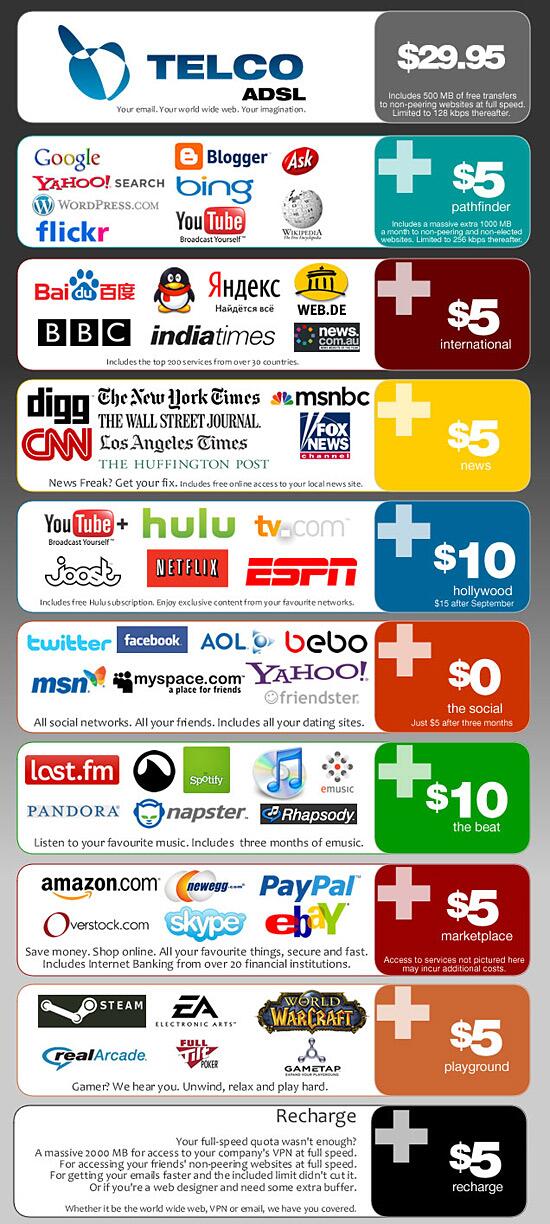The Net Neutrality Endgame
The U.S. Court of Appeals made a significant and troubling decision this week: it shut down a 2010 FCC decree that prevented internet service providers (“ISPs”) from selectively enhancing or restricting traffic to certain destinations (websites, streaming services, etc.) The collective term for this idea has become known as Net neutrality.
If you need help understanding what’s at stake, you must read Nilay Patel’s dissectionon The Verge. While you’re at it, see Fred Wilson’s brief but brutal take on what it means for entrepreneurs and investors.
At the very least, you should take a good look at this mock-advertisement from Cypher on Twitter. It’s the most compelling and succinct illustration I’ve seen. Even the fine print was written with care.
Put simply: the Internet we know and depend on will become something very different. The business relationship with your provider will change its focus from consumption (how many ones and zeros came over the wire) to behavior (what kind of ones and zeros). The latter is much more discriminatory and insidious.
Cypher’s illustration is far from the worst-case scenario. Have a look at your cellular bill: most of us have minute allocations for specific times of the day and/or week. Now imagine a future where Netflix streaming is twice as expensive after 6PM. Where a single Skype call costs as much as a monthly landline.
The privacy implications are just as chilling. A discriminatory model bakes surveillance into the way ISPs do business. Sure, your provider can snoop on your traffic right now, but nothing in the fundamental concept of delivery requires or justifies that they do. With this environment in place, the implications for privacy and anonymity tools like Torshould be obvious: they would be banned in the provider’s terms of service (how else can they know how much to charge and what to block?) and lobbyists would waste no time making them illegal.
It’s sad that this has come to an issue of courts and regulatory bodies. The real problem here is that there’s nowhere else to turn. There is no tangible consumer choice. The infrastructure is effectively monopolized. It will not be possible to vote on this with your wallets: you can submit, or cancel your service. But nobody’s going to stop using the Internet — certainly not in the kind of volume that would make a dent in policy.
The picture above resonates so well because we’ve seen it before. We see these itemized, booby-trapped menus every time we buy television or phone service. So it’s quite difficult to call this vision far-fetched when you consider the people who sell us Internet connectivity are the same people who sell us television and telephone connectivity. This is absolutely the future they want. And if nothing changes, they’re going to get it.
http://www.appleoutsider.com/2014/01/16/neutral/
The U.S. Court of Appeals made a significant and troubling decision this week: it shut down a 2010 FCC decree that prevented internet service providers (“ISPs”) from selectively enhancing or restricting traffic to certain destinations (websites, streaming services, etc.) The collective term for this idea has become known as Net neutrality.
If you need help understanding what’s at stake, you must read Nilay Patel’s dissectionon The Verge. While you’re at it, see Fred Wilson’s brief but brutal take on what it means for entrepreneurs and investors.
At the very least, you should take a good look at this mock-advertisement from Cypher on Twitter. It’s the most compelling and succinct illustration I’ve seen. Even the fine print was written with care.
Put simply: the Internet we know and depend on will become something very different. The business relationship with your provider will change its focus from consumption (how many ones and zeros came over the wire) to behavior (what kind of ones and zeros). The latter is much more discriminatory and insidious.
Cypher’s illustration is far from the worst-case scenario. Have a look at your cellular bill: most of us have minute allocations for specific times of the day and/or week. Now imagine a future where Netflix streaming is twice as expensive after 6PM. Where a single Skype call costs as much as a monthly landline.
The privacy implications are just as chilling. A discriminatory model bakes surveillance into the way ISPs do business. Sure, your provider can snoop on your traffic right now, but nothing in the fundamental concept of delivery requires or justifies that they do. With this environment in place, the implications for privacy and anonymity tools like Torshould be obvious: they would be banned in the provider’s terms of service (how else can they know how much to charge and what to block?) and lobbyists would waste no time making them illegal.
It’s sad that this has come to an issue of courts and regulatory bodies. The real problem here is that there’s nowhere else to turn. There is no tangible consumer choice. The infrastructure is effectively monopolized. It will not be possible to vote on this with your wallets: you can submit, or cancel your service. But nobody’s going to stop using the Internet — certainly not in the kind of volume that would make a dent in policy.
The picture above resonates so well because we’ve seen it before. We see these itemized, booby-trapped menus every time we buy television or phone service. So it’s quite difficult to call this vision far-fetched when you consider the people who sell us Internet connectivity are the same people who sell us television and telephone connectivity. This is absolutely the future they want. And if nothing changes, they’re going to get it.
http://www.appleoutsider.com/2014/01/16/neutral/










